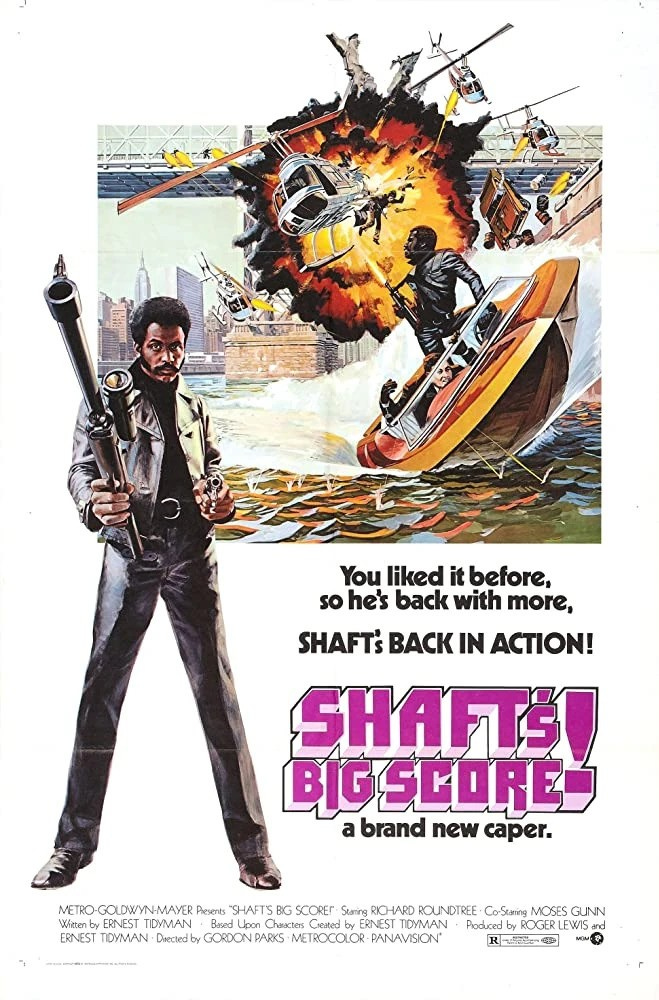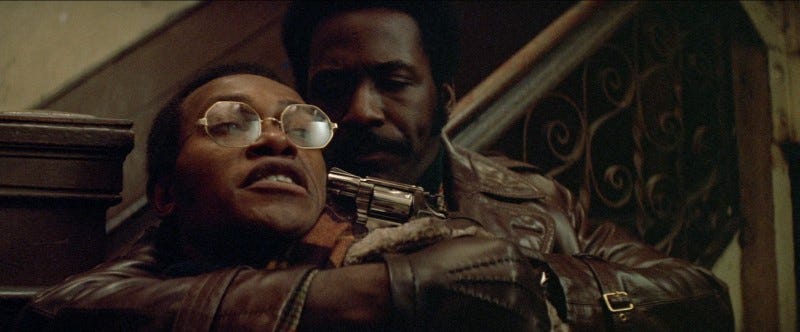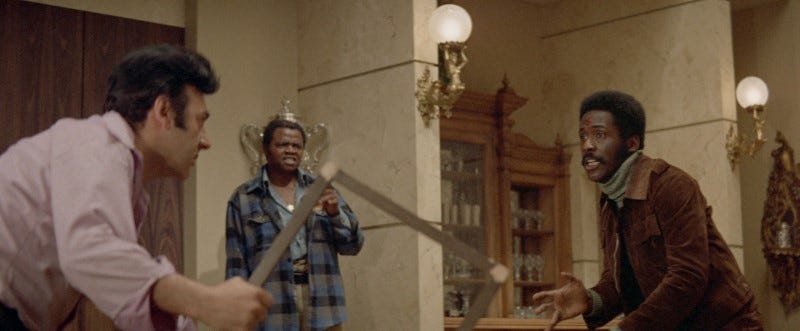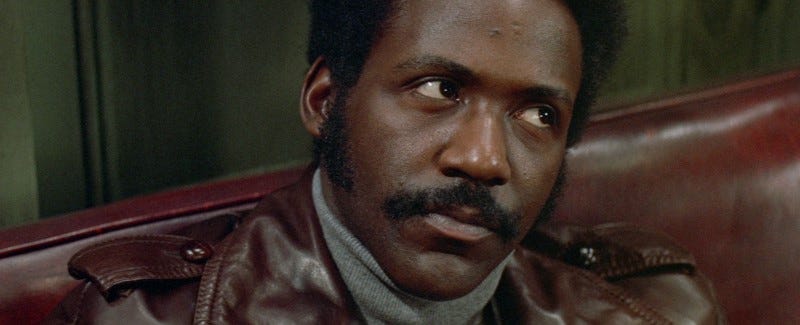Blaxploitation Education: Shaft's Big Score!
Everybody's favorite sex machine returns for some bigger, if less satisfying, action.
Shaft’s Big Score!
Written by Ernest Tidyman
Directed by Gordon Parks
1972
Shaft was one of the first big hits of the Blaxploitation genre, so it made sense that the studio (MGM, which I’m finding was behind many of these movies) would bring him back for a second strut down the streets of New York where he could continue being the cool, tough hero who could take down evildoers while wooing the ladies. However, something seems to have been lost between the first film and the sequel. Richard Roundtree is still the consummate Blaxploitation hero, appearing as cool as ever, but this movie is less about his street smarts and his ability to remain in control even as he’s going up against more powerful figures like the police and various New York mobsters. While he’s still taking on criminal figures and coming out on top, it seems more like he’s reacting to what’s happening around him instead of taking the initiative to solve things on his own, and he doesn’t use his connections to other street-level characters to pull off schemes like he had done previously.
Part of that might be due to the influence of Ernest Tidyman, who wrote the novel that Shaft was based on but was apparently unhappy with the changes that were made when it was adapted to film. After the success of Shaft (and The French Connection, for which he wrote the screenplay), he established a production company known as Shaft Productions, and he took control of the film’s sequels. He has the sole screenwriting credit on Shaft’s Big Score!, and he was also a producer, so it seems like this movie was much more in line with his vision.
The other big change is that the score is by director Gordon Parks rather than Isaac Hayes, and while it’s got a cool, jazzy style, it’s just not the same. Instead of the wah-wah guitars and driving beat of Hayes’ score for the first film, it’s heavy on the horns, sometimes falling back into saxophones that seem kind of stereotypical for noirish detective movies (although maybe they were less of a cliche in the 1970s). There’s a nice opening theme featuring vocals by O.C. Smith and some of the same female commentary and chants of “Shaft!” as the original theme, but it ends up being kind of a pale imitation rather than something that stands on its own.
As for the story, it opens with a middle-aged Black businessman type taking some money out of a safe before calling up Shaft and asking for help (Shaft doesn’t admit it, but he’s currently in bed with the guy’s sister). He won’t give any details, but he has transferred $5,000 into Shaft’s bank account, which is enough to get him out of bed to come see what’s going on. But just as he arrives at the guy’s business, which is apparently a combination insurance office and funeral home, it explodes, showing that he was right to be concerned.
In the aftermath, we learn that the dead guy, Cal Asby (Robert Kya-Hill), was partners with another guy, Johnny Kelly (Wally Taylor, who was also in Cotton Comes to Harlem and Cool Breeze), and the two of them were criminals who had been running a numbers racket in Queens. But while Asby had been trying to use his ill-gotten gains to give back to the community by starting a children’s clinic in Harlem, Kelly is just looking to enrich himself and get ahead in the criminal underworld.
However, Kelly is in trouble, because he owes $250,000 to Gus Mascola (Joseph Mascolo, who will show up in at least one more movie in this series), an Italian gangster who tries to appear classy by hanging out in his skyscraper apartment in a smoking jacket, drinking champagne, and playing classical music on the clarinet. Kelly is trying to pay back this debt with the money he wanted to take from Asby, but it has been hidden, so he tries various schemes to delay things, including attempting to pit Bumpy Jonas (Moses Gunn), the mob boss from the first film, against Mascola as everyone moves in to fill the vacuum in Queens that Asby left.
Unfortunately, all of this is almost incidental to anything that is going on with Shaft. He only gets involved because he has a relationship with Asby’s sister Arna (Rosalind Miles), and Kelly is trying to go after her and get her to sign over her share of Asby’s business. He gets Mascola to send men to kill Shaft, and in response, Shaft confronts Mascola and gets beat up by his thugs. Then, when Shaft delivers a message to Bumpy from Mascola, the two of them almost get killed due to a drive-by shooting that Mascola attempts on Bumpy’s office. This prompts Shaft to go directly after Mascola and stop him from obtaining Asby’s money. If these guys had just left Shaft alone, they probably could have succeeded in their schemes without bothering with the whole plot.
Shaft does get to be as cool as ever, throwing out some nice one-liners when confronted by people who are much below his level. Early on, when a Black cop (Julius Harris (Trouble Man, Super Fly) asks what Asby had told him before his death, Shaft replies, “Stay away from Black honkies with big, flat feet!” Later, when one of Bumpy’s flunkies says something stupid, Shaft says, “You better see a plastic surgeon about your condition.” When the guy asks, “What condition?” Shaft says, “Your mouth is too close to your asshole.”
However, Shaft also seems to be much less effective here, perhaps because he seems to be attempting to handle all of this business on his own rather than getting assistance from various connections. When he goes to confront Mascola about the guys who were sent to kill him, he stupidly does so in the back room of Mascola’s nightclub, setting himself up for a beatdown by a bunch of thugs. Gordon Parks does add some stylistic flair to this scene, intercutting Shaft fighting the goons in slow motion with scenes of some dancers who are gyrating while wearing body paint and elaborate headdresses. In the moment where Shaft seems the least cool, at least the movie tries to make up for it.
The various schemes and the discovery of where the money was hidden all lead up to an extended final action scene with a chase involving cars, a speedboat, and a helicopter, as well as lots of bullets being fired and multiple explosions. It’s pretty over the top, and it’s probably as elaborate and expensive as Blaxploitation action scenes ever got. While it’s enjoyable enough, it does get kind of tedious, but the most ridiculous thing of all happens after it’s over. As Shaft walks away from some burning wreckage, the cops show up, but they don’t bother to detain him or even question him about what happened. They just let him go, giving him a chance to deliver one final quip and walk away as the credits roll. The idea that a Black man who was obviously involved would be ignored by the police as they’re trying to investigate a scene involving massive amounts of destruction and multiple deaths, is just too unbelievable to bear.
While Blaxploitation movies weren’t necessarily known for their realism, they were usually at least grounded in the realistic concerns of the Black community. After taking control of this franchise, Tidyman (a white writer), seems to have failed to realize what made Shaft connect with audiences. With a plot in which any action hero private detective could be swapped in for John Shaft with little difference to the end result, you’ve lost the elements that made the original movie seem so special. In the end, you get an entertaining package, but the soul is lacking.
Blaxploitation Education index:
UpTight
Cotton Comes to Harlem
Watermelon Man
The Big Doll House
Shaft
Sweet Sweetback’s Baadasssss Song
Super Fly
Buck and the Preacher
Blacula
Cool Breeze
Melinda
Slaughter
Hammer
Trouble Man
Hit Man
Black Gunn
Bone
Top of the Heap
Across 110th Street
The Legend of N***** Charley
Don’t Play Us Cheap








